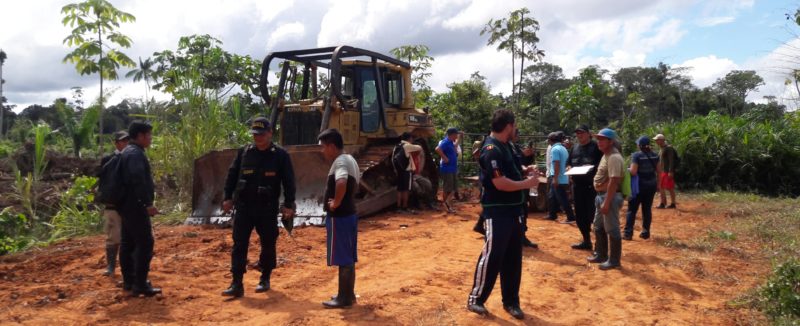In an initial public statement, the Complaints Panel of the RSPO (Roundtable on Sustainable Palm Oil) condemned Plantaciones de Pucallpa (PdP) for its destruction of primary forests in Peru in violation of the RSPO’s code of practice. The RSPO’s findings come despite PdP’s withdrawal from the membership in October 2016. A full report from the complaints panel addressing the human rights impacts is still forthcoming.

“The RSPO Complaints Panel has found Plantaciones de Pucallpa (PdP) (Peru) to be in breach of RSPO Code and Conduct and RSPO Principles and Criteria (RSPO P & C) during its membership period from 14 October 2013 to 12 October 2016.”
After over a year of deliberation and an independent satellite analysis commissioned by the RSPO, the Complaints Panel concurred with the complaint filed in December 2015 by the Shipibo community of Santa Clara de Uchunya that PdP had deforested over 5,000 hectares of forests, including primary forests.
In so doing, it had failed to comply with RSPO’s restrictions on the conversion of primary forests to plantations, measures to address risks to forests considered of High Conservation Value (HCV) and requirements to disclose all information about planting and conversion plans to the RSPO and affected communities.
The Complaints Panel rarely issues rulings after companies have withdrawn from membership of the RSPO. However, in this case the Complaints Panel found that there was “clear evidence that compensation liability would have been incurred,” but notes that “these findings and decision are of moral and persuasive value only, and cannot be enforced in light of Plantaciones de Pucallpa’s resignation as a RSPO member.”
Since its operations began in Shipibo territory, the operations of PdP, whose owners have created a new company called Ochosur SAC since leaving the RSPO, have been enveloped in controversy. Despite successive rulings, fines and suspensions on the part of different Peruvian government agencies, the operations continue and in recent weeks community members have reported further forest destruction to expand the plantation and more death threats.
One community member, Huber Flores Rodriguez, whose house and farm border the plantation, has recently reported several incidents where he has been accosted at night by groups of men threatening him and his family if they didn’t abandon their house. Mr. Flores claims that these include individuals with close ties to the palm oil company and a local land trafficking mafia connected with the regional Ministry of Agriculture. In February 2017, Mr Flores formally filed a request for physical guarantees from the Interior Ministry, but to date there has been no response.
Carlos Soria, head of the community of Santa Clara de Uchunya, said: “We are practically living under siege in our own territory. Almost every day there is more expansion of the plantation and anyone who challenges them is threatened. Our lands are still untitled and the plantations continue to operate. It seems that they are growing bolder seeing that the government is doing nothing. Do we have to die like Edwin Chota before they do anything? Where are we supposed to live? If our home is destroyed what hope for us and our future generations?”
Robert Guimaraes, President of FECONAU, added: “After a year of deliberation, the RSPO has determined that Plantaciones de Pucallpa destroyed primary forests and compensation should be paid. But what are our own authorities doing? There are lawsuits that were filed by the community almost three years ago that remain unresolved, the government ordered the suspension of the operations almost two years ago but the plantations and destructions continue to expand and the community and its allies are subjected to increasing aggression and threats while their lands remain untitled.
“Yet at the same time the government is receiving millions of dollars from the Norwegians, the Germans and the World Bank for its programme to protect Peru’s forests and title indigenous territories. What will it take for the government to finally step up and meet its promises to protect Peru’s forests and our rights as indigenous peoples?”
Conrad Feather from Forest Peoples Programme notes: “We welcome the RSPO’s initial resolution and await the findings on the requirements to respect indigenous peoples’ customary land rights. However, what hope of justice or redress for communities if companies can neutralise a complaint simply by resigning? The RSPO must address this if it is to have any credibility in Latin America.”
